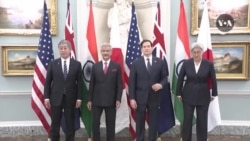The new top U.S. diplomat meets with Indo-Pacific allies aiming to counter China’s military and economic ambitions in the region.
Welcome to VOA Asia Weekly. I'm Chris Casquejo in Washington. That story is coming up, but first, making headlines:
On his first day in office, U.S. President Donald Trump signed an executive order giving social media app TikTok's Chinese owner a 75-day extension to find a U.S. buyer or be banned in the country. The site briefly went dark for its 170 million U.S. users last weekend. This after the U.S. Supreme Court upheld legislation requiring that TikTok's U.S. affiliate become an American company or be banned due to national security concerns.
"We are grateful and pleased to have the support of a president who truly understands our platform. One who has used TikTok to express his own thoughts and perspectives."
Impeached South Korean President Yoon Suk Yeol and former Defense Minister Kim Yong Hyun appeared at a hearing of Yoon's impeachment trial on Thursday. Yoon, impeached and suspended from power on December 14th, has been incarcerated since last week while investigators probe his December 3rd attempt to impose martial law.
Rescuers found four more bodies Wednesday on the main Indonesian island of Java, bringing the death toll from flooding and landslides up to 21. Search teams suspended rescue efforts Tuesday because of heavy rains.
Authorities in Thailand are denying an assertion from human rights groups that the country plans to send 48 Uyghurs held in detention centers back to China. U.N. experts warn that the group could face torture if they return. The Uyghurs fled during China’s crackdown on the ethnic group more than a decade ago.
A stealth frigate, an attack submarine, and a missile destroyer are among the approximately 40 naval warships that India plans to add over the next decade. Analysts say the country is building up its navy because China's infrastructure projects are bringing the rival nation closer to New Delhi’s shores in the Indian Ocean. 90 percent of India’s trade, including vital energy supplies, passes through the ocean daily.
On his first day on the job, U.S. Secretary of State Marco Rubio met with his staff and spelled out his foreign policy priorities. He also met with allies from the Indo-Pacific region who seek to counter Chinese military and economic ambitions. VOA’s Veronica Balderas Iglesias reports.
On his first day as U.S. secretary of state, former Republican Senator Marco Rubio told his new employees that their department will promote peace around the world.
“Without peace, it is hard to be a strong nation, a prosperous nation, and one that is better off.”
But avoiding conflict will be a strategic decision.
“Never at the expense of our national security, never at the expense of our national interest, and never at the expense of our core values as a nation and as a people.”
Rubio also met Tuesday with the foreign ministers of India, Australia and Japan. The four countries form the Quadrilateral Security Dialogue, or “Quad,” a bloc that aims to counter China’s economic and military ambitions in the Indo-Pacific region.
Tuesday’s gathering eased some concerns about the America First approach under President Donald Trump.
“Is a clear signal that the U.S. is not abandoning the regional coalition allies and partners in terms of how to counter China’s rise.”
Beijing denounces the Quad as a Cold War construct.
“Any time that the U.S. aligns with its allies or partners, the Chinese will feel isolated and feel threatened, and they will accuse the United States of the Cold War mentality.”
The analyst pointed out that China’s modernization and expansion of its military and nuclear arsenal will only continue driving countries in that region to strengthen their own militaries and seek a closer alignment with the United States.
Veronica Balderas Iglesias, VOA News, Washington.
Visit voanews.com for the most up-to-date stories.
I’m Chris Casquejo.
Finally, praying for better math skills in Japan.
More than a hundred children, ages 5 to 10, knelt in front of abacuses, known as sorobans, as a Shinto priest said prayers.
Sorobans are familiar to most of the older generations in Japan. They were used for counting gains and losses in businesses before computers.
They are no longer taught in schools, but among children, using them is a popular extracurricular activity.
Thanks for watching VOA Asia Weekly.











